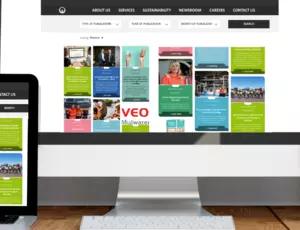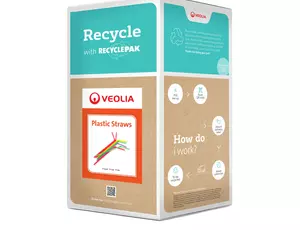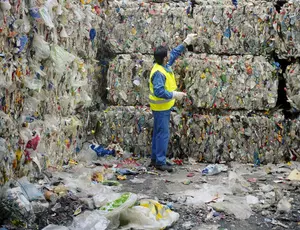It might be the last straw, but Veolia says it doesn't have to be one that further damages the environment.
Governments across Australia continue to introduce restrictions on the sale or supply of problematic single-use plastics. In NSW, the next stage of the ban comes into effect on 1 November so it’s important to know how that will impact your business. Veolia is here to help you with the disposal of your plastics to support and reduce the impact on our environment.
What is happening in NSW?
The NSW Government has announced that in addition to the lightweight single-use plastic bags ban introduced on 1 June 2022, the state is also banning the supply of many single-use items from 1 November 2022, including:
- Plastic cutlery, stirrers, straws plates and bowls (except where designed or intended to have a spill-proof lid).
- Expanded polystyrene (EPS) food service items (including EPS clamshells, cups, plates and bowls).
- Plastic cotton buds.
- Certain rinse-off personal care products containing plastic microbeads.
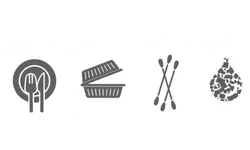
To learn more about the ban and the expectations issued by the Environment Protection Authority, click here.
What does this mean for your business?
Businesses should stop ordering banned items now and should use up existing stock. They cannot continue to supply banned stock after the ban deadlines, even if it was purchased before those dates. View the guide for businesses here.
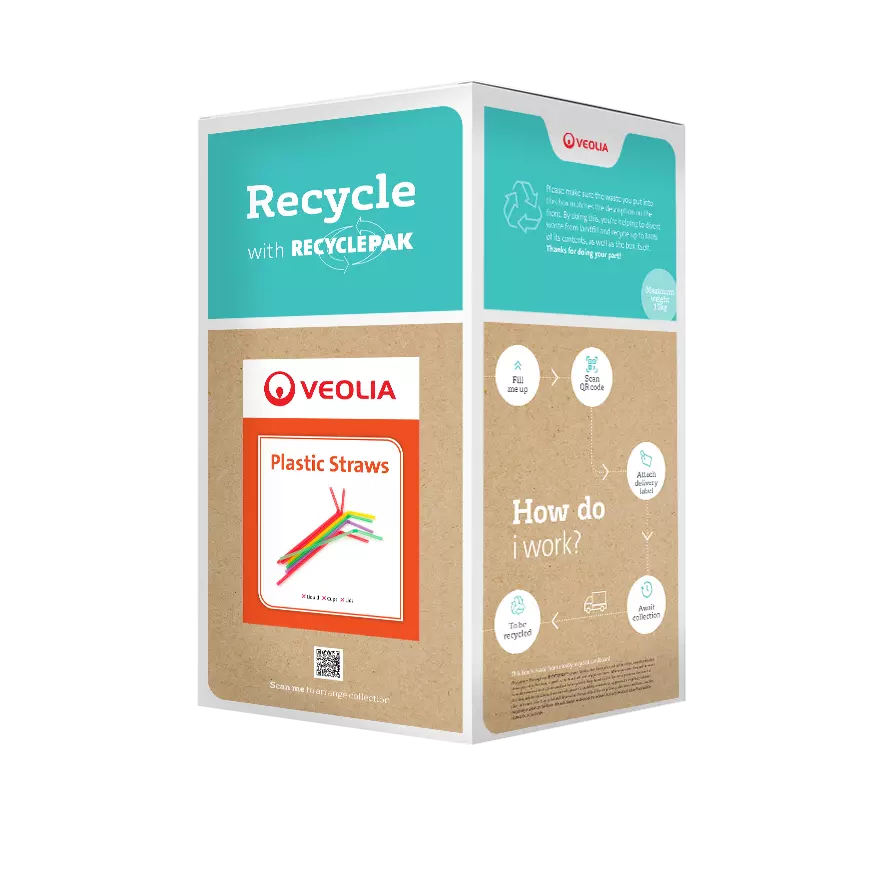
How can Veolia help you transition through the ban?
Veolia offers a complete door-to-door recycling solution, RECYCLEPAK®, that includes everything you need to dispose of your unwanted and banned plastic items in a sustainable and environmentally friendly way: packaging, freight and recycling. RECYCLEPAK® targets hard-to-recycle items such as plastic straws and snack wrappers and finds dedicated recycling or recovery methods that responsibly divert them from landfill. The solution is designed to help businesses conveniently recycle items in a cost-effective and environmentally responsible manner.
Veolia customers can order a RECYCLEPAK® box online. When the full box is ready for collection, simply scan the QR code on the box to arrange collection right from your door. To learn more or order RECYCLEPAK® , click here.
HOW CAN WE HELP YOU?
Find out more about how we can support your business.
Our experts are always on hand to deal with your request.
Frequently asked questions
Why is the NSW Government banning some single-use plastic?
While plastic is a versatile and useful material, incorrect disposal is increasingly threatening our natural environment. According to the NSW Government, plastic packaging and single-use plastic items make up 60% of all litter in NSW. A number of the most littered single-use plastic items will be banned under the Plastic Reduction and Circular Economy Act 2021. These bans will prevent nearly 2.7 billion plastic items from entering the coastal, marine and bushland environments of NSW over the next 20 years.
Will the ban apply to all states?
Seven out of eight Australian states and territories have committed to banning many single-use plastics in some form:
- ACT started on 1 July 2021 with the ban on single-use plastic cutlery, drink stirrers and polystyrene food and beverage containers and continued on 1 July 2022 with straws, cotton bud sticks and degradable plastics. More details are here.
- NSW started on 1 June 2022 with lightweight plastic bags. From 1 November 2022, several other single-use plastics will be prohibited. More details are here.
- NT has committed to a ban by 2025. More details are here.
- QLD started on 1 September 2021, banning single-use plastic straws, drink stirrers, cutlery, plates, bowls and polystyrene food and beverage containers. On 1 September 2023, the ban will be extended to plastic microbeads, cotton bud sticks, loose-fill polystyrene packaging and the mass release of lighter-than-air balloons. More details are here.
- VIC is set to start the ban on 1 February 2023. More details are here.
- SA started on 1 March 2021, banning single-use plastic straws, drink stirrers and cutlery. On 1 March 2022, polystyrene food & beverage containers as well as oxo-degradable plastics will be added to the ban. More details are here.
- WA started on 1 July 2022 with plastic plates, bowls, cups, cutlery, stirrers, straws, thick plastic bags, polystyrene food containers and helium balloons. By 2023, further plastics will be banned. More details are here.
- TAS has made no commitments yet to ban single-use plastics.
How are single-use plastics identified?
A banned single-use plastic item is one that is made wholly or in part of plastic and is not reusable. They are used only once before they are thrown away or recycled. These items include plastic bags, straws, coffee stirrers, water bottles and most food packaging.
How are plastic microbeads identified?
Like all single-use plastic items, microbeads are designed to be used once and then discarded. These are commonly washed down the drain and end up in waterways where they do not break down for hundreds of years and harm the environment and wildlife. Avoid rinse-off personal care products such as face and body cleansers, exfoliants, masks, shampoo, conditioners and hair dyes, and toothpaste that contain microbeads. Look for the following commonly used ingredients found in single-use plastic products:
- Polyethylene (PE)
- Polypropylene (PP)
- Polyethylene terephthalate (PET)
- Polymethyl methacrylate (PMMA)
- Nylon (PA).



